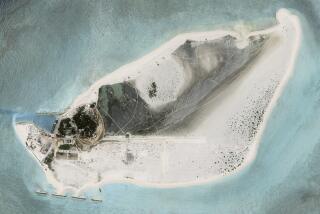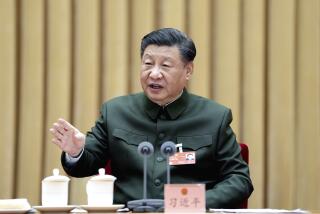CHINA: THE GIANT AWAKENS : View From Hong Kong : Colony Looks to South China After ’97 : Family and language ties suggest post-reversion economic relations will be tightest with nearby province. Where money flows, culture may follow.
Deng Lin, the artist daughter of China’s senior leader Deng Xiaoping, voiced strong praise during a recent visit here for this British colony’s contributions to China.
“Hong Kong functions as a bridge,” she noted at a news conference. “In both economics and culture, it is a point of interaction between East and West.”
Partly because of hardball diplomacy by Deng Xiaoping himself, the future of this vibrant international crossroads is laced with uncertainties. Under a 1984 Sino-British agreement, Hong Kong will revert to Chinese sovereignty on July 1, 1997, and how the mainland authorities handle the switch is crucial.
Despite Beijing’s pledge to maintain Hong Kong’s free economic and social systems for at least 50 years, most observers say that some erosion of political freedom for Hong Kong’s nearly 6 million people is almost inevitable. Less clear is whether the loss will be moderate or severe.
As Deng Lin’s comment suggests, however, a related question is what effect Hong Kong is likely to have on Chinese society in the decades ahead. The answer to that lies largely in the nature of Hong Kong and its people.
Like the United States, Hong Kong was built by immigrants and the descendants of immigrants, and its people exhibit much of the same free spirit and restless entrepreneurship that helped America grow. It is a temperament far removed from the conservative, grounded-in-the-earth, traditional soul of northern China, where ancestral villages and imperial bureaucracy were familiar constants surviving over the centuries.
*
Nora Ann Yeung, a retired schoolteacher who was born here, recalled watching the first great wave of refugees flood into Hong Kong in 1948 as Communist armies swept toward victory in China’s civil war.
“I remember walking home from school and hearing a plane from China land every five minutes,” Yeung said. “A lot of Chinese people flew from Shanghai to Hong Kong. In 1948, we used to go . . . and watch the new immigrants coming in from Guangdong province. So many Cantonese from mainland China walked across the border into Hong Kong!
“The population here began to rapidly increase. A lot of people from southern China opened their own restaurants, while the Shanghainese began to buy office space.”
Uprooted but ambitious, the refugees brought a commercial spirit that served Hong Kong well as it became an increasingly important center for international trade.
Shanghai-born M. C. Chen managed to get out of mainland China in 1963, arriving here, he said, “with only one Hong Kong dollar in my pocket.” A college graduate, Chen sought help from fellow alumni of Shanghai’s Jiaotong University. He found work as a ship designer for $50 a month. He lived at first in a dormitory, renting a bed for $2.60 a month. Evenings, he attended English classes.
After 21 years in the shipping business, he quit his job and opened his own transport firm.
“I started off with four people working for me, and now I have 11 employees,” he said. “In 1992, we made a profit of Hong Kong $4 million (U.S.$517,000). We ship Asian goods throughout the region. Today I live in a 3,300-square-foot apartment. I’ve had to work very hard, but I’ve succeeded.”
*
What will it be like, for such people and for China itself, after 1997? Some will flee, such as Yeung and her husband, who already have visas to resettle in Canada. But most will stay, enmeshed in a complex relationship with their Cantonese cousins in Guangdong province and the more remote northerners in Beijing.
Hong Kong will continue to make “mainly economic contributions” to China’s development, predicted Joseph Chan, a political scientist at the University of Hong Kong. “It’s a contribution of capital, investment, entrepreneurship skills, management skills, etcetera. But of course, it is likely that there are some other unintended consequences which flow from this.
“Beijing would not regard as a contribution the influence of the Hong Kong popular culture, such as the Hong Kong way of life, which includes various kinds of civil liberties. It may generate a demand for greater political and economic freedom in southern China. . . . (But) if they want to use the market mechanism to generate wealth, they must realize that the market mechanism is not the only valuable thing in Hong Kong.
“Here we have more or less an independent judiciary system, we have a free press, we have a basically clean bureaucracy, we have some liberal values. All these I think are essential to maintaining a civilized, humane society.”
Since most Hong Kong people speak Cantonese, and have relatives in neighboring Guangdong province where Cantonese is widely spoken, many observers expect cross-border ties to be smoother than relations between Hong Kong people and northern Chinese, who generally speak Mandarin. This cultural and emotional factor, in addition to geographic proximity, means that Hong Kong’s economic contributions will probably continue to be concentrated in the south.
“For Hong Kong people, it’s just much easier to do business in Guangdong than other areas,” said Robert Broadfoot, managing director of Political & Economic Consultancy Ltd. in Hong Kong. “You can go in and talk business in Guangdong. You don’t have to put up with the Chinese mating dance of let’s sit down and ‘talkie-talkie’ for about five years before we get something done. Hong Kong people don’t have time. Hong Kong people don’t like to dillydally around.”
Lau Siu-kai, a sociologist at the Chinese University of Hong Kong, said he sees “two contradictory tracks” unfolding in the Hong Kong-mainland relationship.
“After 1997, Hong Kong people will feel themselves closer to China and think they share the similar fate of the mainland Chinese people,” Lau said. “Hong Kong’s economic future would depend on China’s economic future.
“On the other hand, as the Hong Kong people still resist Chinese communism, I would expect Hong Kong people to continue to emphasize their differences with the Chinese people and to resist cultural relations. . . . People may still try to emphasize the Cantonese dialect and use popular culture as a means to separate Hong Kong from northern China.”
However worried the people of Hong Kong may be, there’s reputedly at least one old man in Beijing who thinks smooth seas lie ahead. Deng Lin was asked at her news conference how her 88-year-old father feels about Hong Kong’s future.
“Just think!” she replied, in a tone of voice implying the question itself was a bit foolish. “It is sure to be bright!”
Holley is a Times staff writer based in Beijing and Courtney is a special correspondent in Hong Kong.
More to Read
Start your day right
Sign up for Essential California for news, features and recommendations from the L.A. Times and beyond in your inbox six days a week.
You may occasionally receive promotional content from the Los Angeles Times.






